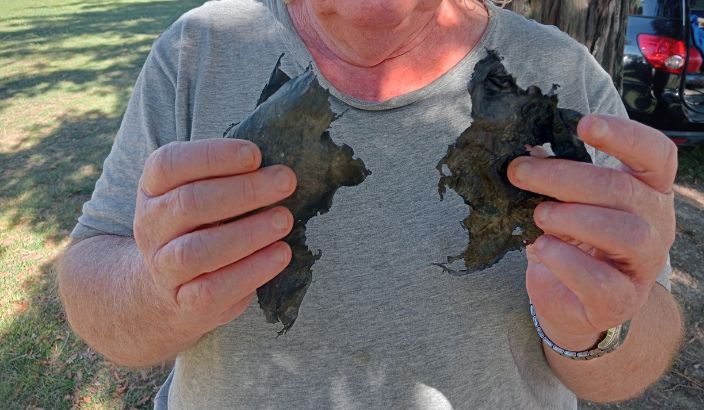Underlying plastic sheeting problem


Strips of black plastics which have prompted a complaint. Photo: Supplied.
A broader issue lies beneath local market garden soil. Waimea Weekly was contacted in recent weeks, alleging black polythene was “ploughed into the ground” during a watermelon harvest at a Ranzau Rd West market garden, causing the black plastic to tear and blow around the area.
Tasman District Council (TDC) says it also received a complaint, and its compliance team investigated and established that the material from the market garden in question was thin plastic sheeting used in its operations to produce melons and other crops.
It says the practice was emulated across the Waimea Plains and nationwide.
“The market garden we visited is undertaking best practice with plastic removal to avoid any further impacts,” the council says. “Windblown material affecting our local environment is not only undesirable but contravenes rules and regulations therefore requiring the council to address the issues using the wide range of tools available to it.
“We will be working with [our main market gardeners] to ensure best management practices are used with the post-harvest removal of the plastic sheeting from the soil surface.”
TDC says plastic from many years of use on some of the Waimea Plains horticultural blocks was a larger problem, and its 100 per cent removal will be strenuous. “Plastic sheeting which was not fully removed from the soil after harvest has potentially been cultivated back into the soils, breaking down into smaller pieces which become airborne during windy conditions,” the council says.
“As it’s likely to be an issue beyond the Tasman District, we have contacted [Horticulture NZ] for the purpose of discussing the concerns of legacy plastics with them.
“While we’d like to see a move towards a reduction of such plastics being present, we acknowledge it is an important part of producing some of the district’s crops.”
Horticulture NZ says plastic use in practices like vegetable growing was important for “optimum” growing conditions to support year-round production for the domestic market.
“It keeps soils warm and moist helping to reduce the amount of water used to irrigate plants,” it says.
“The use of the plastic also reduces the pest burden for plants, meaning that growers are less reliant on agrichemicals to manage weeds.”
